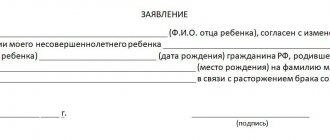Unlike changing a surname, changing a child’s middle name is much more difficult. This is complicated by the fact that replacement is only possible if the child is adopted by a new father, provided that the natural father has been legally deprived of parental rights.
There are cases when a baby’s birth certificate contains a dash in the “Father” column or the data was filled out from the words of a single mother. As a rule, in the future the mother gets married, and the child has a second adoptive father. In this case, the child will receive the middle name of his adoptive parent without any problems.
Changing the surname and patronymic of a minor child
Family life is not as simple as it seemed even before the wedding; you will have to put up with everyday and financial difficulties and raise children together. Not all spouses can stand this and some couples separate. Husbands and wives often have questions about who their young children will stay with and how to change their child’s last and patronymic names. From our article you will learn how, within the framework of the current legislation of the Russian Federation, you can change the personal data of minor children, what situations occur during this procedure, and how to act correctly in them. You can change your baby’s last name even without the father’s permission, you just need to follow the legal route.
When parental permission is not required
Some children who have reached the age of 14, but are still minors, have the right to make their own decisions regarding changes to their surname. The right to this action gives the status of an emancipated person.
Simply put, a child who supports himself independently, without the help of his parents, does not need their legal consent. To obtain the status of an emancipated minor, he must either have an employment contract in hand or be engaged in a confirmed business.
Father's consent to change the child's surname
It is not easy to change the surname of a joint child after the divorce of the parents, if the father or mother is against it. With the consent of both parties, this procedure is much simpler and faster, but even this does not negate the completion of some basic stages.
Father's permission sample
First of all, the applicant should draw up a written consent on his own behalf, and obtain the same document from his husband or wife. If one of the spouses is responsible for all questions about changing the child’s personal data, the application received from the other party must be certified by a notary.
Then you need to contact the guardianship and trusteeship authorities (TSA) for permission. Since you are going to change the data of a minor child, you cannot do without the permission of the guardianship service, even if both parents give their consent. The POiP will check whether the rights of young children are being violated, and only after that you will receive permission.
When contacting a government agency, you need to provide the following documents:
- Passports of both parents.
- Child's birth certificate.
- Document on divorce.
- Application from spouses to change the baby’s personal data.
- The child’s consent in writing if he is over 10 years old.
- A new marriage certificate if the child’s mother remarried.
The guardianship and trusteeship authorities review the submitted documents within 30 days and make a decision whether to issue a permit or refuse. Such a decision will be provided to the applicant spouse in the form of an order or instruction. Also, the response time from the guardianship service directly depends on the region of residence of the spouses.
How much are standard payments to single mothers?
By default, the payment of financial assistance to single mothers is regulated by Federal Law No. 81. From February 1, 2021, a mother who is in single status, when a child is born, has the opportunity to receive a one-time benefit, the amount of which amounts to 18,886 rubles. Moreover, the benefit applies to each child born, does not depend on whether it is intended for a working or non-working single mother, and does not take into account the woman’s current income. Another thing is that if a mother does not work, she is deprived of the opportunity to claim the right to the most significant government payment - leave pay for pregnancy and childbirth. And her allowance for caring for a child up to one and a half years old will amount to only the minimum amount - 5036 rubles for the first baby, and a little more - 6803 rubles - will be the amount of financial support for a single mother for each child up to 1.5 years old, if she is raising two , three or more children.
The one-time payment upon the birth of a child may be increased depending on the region of residence of the single-parent family. Thus, in Moscow, in addition to the established amount of financial assistance to a single mother, upon the birth of her first child, a single mother receives an additional 5,500 rubles. If a single mother gives birth to a second, third child, and so on, payments to such a Muscovite from the state for each second and subsequent newborn will amount to 14,500 rubles in addition to the usual benefit.
pexels.com/Sarah Chai
How to change a child's last name if the father does not agree
With the consent of both parents, changing the baby’s personal data occurs without problems. But if the father is against it, the procedure may be significantly delayed. To change a child's last name, the mother gives a compelling reason why the child should not be in the father's last name. The algorithm of actions is specified in Articles 58-63 of Federal Law No. 143.
The procedure for changing a surname is as follows:
- The mother submits an application to the guardianship and trusteeship authorities. In the document, indicate the reason why the child should not bear the father’s surname. If the father is against it, his opinion will be heard at the guardianship and trusteeship service, and then the authorized body makes a decision.
- If the guardianship decision is made in favor of the mother, she receives an order and applies to the registry office with these documents. In addition to the order, you also need to provide your passport and the child’s old birth certificate.
Some other payments specific to single mothers from 2021
Maternity payments for low-income single mothers . They were introduced in Russia on July 1, 2021. The key requirements for obtaining this preference are to register for pregnancy before reaching 12 weeks, have an income less than the subsistence level, work, be on maternity leave, be registered with an employment center, or not work, for example, due to disability.
Benefit for children under 17 years of age . This payment for single mothers appeared in the country on July 1, 2021. Financial assistance of this kind will be issued every month, but the application for its receipt will need to be updated annually. It is important that not only single mothers, but also fathers, as well as official guardians of children from 8 to 17 years old, are entitled to receive the payment. The average per capita family income in this situation also cannot go beyond the subsistence level established in a particular region of residence.
How to change the middle name of a child under 14 years old
In some cases, after a divorce, a woman wants to change not only her surname, but also her patronymic.
This is only possible under the following circumstances:
- The mother remarried and the child was officially adopted by the new father.
- The natural father has been deprived of parental rights.
- There is a dash in the “patronymic” column on the birth certificate.
- The husband challenged his paternity.
- Information about the natural father is included in the certificate only from the words of the mother.
To change the child’s middle name, the mother must contact the guardianship authorities, and permission from both parents will be required.
But there are cases when you can change your middle name without the consent of the other party:
- The spouse is officially declared incompetent.
- The father or mother has been deprived of parental rights by court.
- It has been proven that the father does not take part in raising a common child.
To prove all of the above cases, supporting documents will be required.
Other privileges and benefits for single mothers
It is important to understand that a mother who is officially single does not lose the right to receive regular benefits, benefits and privileges that are due to all mothers.
“First of all, it must be said that the benefits intended for single mothers are the same as for other parents, however, there are a number of additional payments directly for mothers raising children alone, including mothers of large families,” comments Yuri Kapshtyk. “For example, until the child reaches one and a half years old, a woman in this position will be paid a monthly allowance to a single mother. In such cases, she will also be entitled to single mother support payments for up to three years.
Plus, it is legislated that a single mother cannot be fired from her job, including due to a reduction in the staff of the workforce. You also cannot send her on a business trip without obtaining additional consent. In addition, a single mother has the opportunity to receive unlimited sick leave to care for her child until he reaches seven years of age. Well, an important point is that a single mother has the right to claim a double tax deduction. If we talk about new benefits for single mothers, it is worth noting, for example, that from September 1, 2021, they, like all parents, receive additional one-time financial assistance in the amount of 10 thousand rubles to prepare the child for school and 3 thousand rubles each for each child to purchase a school uniform.”
Like other parents, single mothers have the opportunity to receive maternity capital, which they can use to improve living conditions, purchase a plot of land with subsequent development, or to educate a child. At the same time, the amount of maternity capital depends on how many children are raised by a woman recognized as a single mother.
A separate category of mothers are low-income single mothers, who, of course, can also take advantage of the right to receive government benefits. An incomplete family is recognized as low-income, based on an additional assessment of the circumstances of the standard of living - if the material support for one family member, including the child and the mother herself, is an amount not exceeding the subsistence level.
“In this situation, the mother can count on preferential payment for housing and communal services, free provision of meals to the child in a secondary general education institution, and the right to priority enrollment of the child in budget-funded places when entering a university. In addition, low-income single mothers have the right to request sanatorium-resort treatment for their child,” says the expert.
It should also be borne in mind that in different regions of the country the package of benefits, subsidies, additional payments and other privileges may differ, so a specific list of them should be requested from the local social security authorities and, to obtain, contact the guardianship authorities, the pension fund and the MFC.
Changing the surname and patronymic of a daughter or son after 14 years of age
According to the current legislation of the Russian Federation, when a child has reached the age of 14, he has the right to make some decisions on his own, but all responsibility still lies with his parents. This right is spelled out in Art. 59 of the Family Code of the Russian Federation. If a teenager has expressed a desire to change his last name, but his parents are against such a decision, this will be a significant obstacle. The same as in the case when parents demand a change of surname or patronymic, but the child is against it. Only the court has the right to resolve such controversial issues.
With parental permission
If a teenager wants to change his personal data and his parents are not against such a decision, he must submit an application and written consent from both parents to the registry office at his place of residence.
If the child is already 14 years old, permission from the guardianship and trusteeship service is not required.
Possible advantages and disadvantages of acquiring the status of “single mother”
The status of a single mother, recognized at the state level, is in many ways a double-edged sword. On the one hand, a child without a father may have more freedom in his movements, because the mother will not have to, for example, obtain permission from the second parent to take the child abroad. On the other hand, a woman who has officially become a single mother does not have the right to demand alimony from a man. What is better: benefits and financial assistance provided at the state level, or alimony, which sometimes has to be obtained through the courts and waited for years? A single mother must decide this issue on her own, thoroughly weighing the pros and cons.
Changing a child's name: reasons.
There are quite a lot of reasons for changing a name. Moreover, the procedure can be performed at any age.
There is an opinion that a name influences a person’s future fate, so some, wanting to completely change their lives, strive to start with a name.
There are several main reasons why there is a need to change personal data:
- A dissonant or difficult to pronounce name;
- Adopting a child into a family or canceling the procedure;
- Divorce of parents;
- The desire of adults to give a name in accordance with national traditions;
- Marriage, etc.
Thus, there are many reasons for changing personal data. Most often, the basis for changing a name is subjective.
✅ How and where to submit documents. Step-by-step instruction
To change your name:
- Pay the state fee in the amount of 1,600 rubles. (based on Article 333.26 of the Tax Code). Details for paying the state fee must be obtained from the registry office where you are submitting the application. The state fee is paid in the applicant’s old name. For each additional document that the registry office will issue in connection with a name change, you need to pay an additional 350 rubles. Such additional documents may include birth certificates and divorce certificates.
- Contact the registry office at your place of residence or place of birth registration with a set of documents and an application.
- Wait for a call from the registry office.
You can submit an application using the State Services portal. But to obtain a certificate of name change, you still need to go to the registry office.
Go to the State Services portal
How long will it take to make a decision?
The standard period for consideration of an application is 1 month from the date of receipt of documents. The deadlines can be extended to three months if the documents necessary for changing the name were issued by another registry office.
Result
The process ends with the issuance of a certificate of name change.
The procedure itself for issuing a certificate and, if necessary, issuing a new birth certificate will take no more than 60 minutes.
Legal basis
Is it possible to change a child's middle name? In this case, it is necessary to answer this question more precisely. To do this, you need to clearly study the norms of the current civil legislation.
So, according to legal norms, it is impossible for a child to change his middle name until he is fourteen years old. However, you can change your first and last name.
But there is one exception here. If a child is adopted by another man, then he assigns his patronymic to the child. It's completely legal.
In addition, if a minor is already fourteen years old, then he has the opportunity to change his patronymic. But for this he needs to get his parents' permission.
So, after studying the legal side of the issue, you can proceed to active action. If a parent still wants to change the middle name of his child, then he must prepare some documents (originals and photocopies).
What still needs to be provided? To complete this procedure you will need:
- baby's birth document;
- parental permission to change the middle name, which must be notarized (otherwise the registry office simply will not accept it);
- passports of legal representatives;
- an application written in the prescribed form (issued at the registry office).
Depending on the reason for changing the patronymic, a certificate of marriage or divorce should be attached to the package of documents. Do not forget that the service is paid, and you will need to attach a receipt for payment of the state duty to the rest of the papers.
Basic moments
Of course, parents are not chosen, and the middle name assigned to the child at birth by the father (if mom and dad were married or lived together) is considered an integral part of the baby’s name. However, it very often happens that after the end of a relationship, a man leaves, and a woman marries again and wants her child to have a new dad, who would give the latter his patronymic and surname. But is this possible? Practice shows that it happens in different ways.
The procedure for changing a patronymic is very complex and has many different legal nuances. However, if you wish, you can still achieve a change even in the full name of your child. The main thing is to approach this issue correctly.
What could be the reasons for changing a child’s middle name? This is a very interesting question. In fact, these reasons may be different. For example, someone simply doesn’t like their middle name. Or a citizen wants to bear the patronymic name of the person who raised him instead of his own father. There are also cases when women themselves want to change part of the child’s name in order to forget their past.
The patronymic name is replaced after the baby is adopted by another person. This is important to know.










